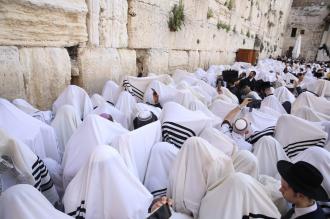‘Passover’ is the most common translation for the holiday of Pesach that we celebrate each year. It simply accents the manner in which G-d passed over the homes of the Jews, sparing them from the fate of the firstborn Egyptians who perished on the night of redemption.
But does פסח, Pesach, actually mean to just pass over? Rashi goes to great lengths, in several places where this notion of G-d having bypassed the Jewish homes appears in our portion, to first suggest it means to ‘skip’ or ‘jump’. Rashi quotes from the Mechilta that actually depicts G-d ‘jumping from one Egyptian to another Egyptian, and the Israelite in between being saved’.
G-d wasn’t just ‘passing’ them over; He actually, if one could possibly state that, had to ‘jump’!
Additionally, Rashi, again sourced in the Mechilta, relates how the word פסח, Pesach, can also mean to have compassion, reflecting on G-d having exhibited pity on his beloved children in saving them.
Strangely, the verse Rashi cites where the word פסח, Pesach, intimates empathy is the only time in all of Tanach it is used in that context.
The Prophet Yeshayahu foretells how in the days of King Chikiyahu, an angel will strike the besieging army of Sancheriv, numbering 185,000, and they will all die. But ‘like flying birds, so shall the Lord of Hosts protect Jerusalem, גנון והציל פסוח והמליט (ישעי' לא ה), protecting and saving, being compassionate and rescuing.
Tradition tells us that this episode took place on the night of Pesach! What might be the deeper correlation here?
Finally one must wonder as to why the emphasis on the: ‘passing over’; ‘skipping’; ‘jumping’; compassion? It is merely a detail in their exodus; in what way does this embody the entire essence of this glorious event and holiday so named for it?
In another fascinating observation, the verbs דלג, skip, and קפץ, jump, appear sparingly throughout Tanach, and appear only one other time in the context of G-d ‘skipping’ and ‘jumping’.
קול דודי הנה זה בא מדלג על ההרים מקפץ על הגבעות (שה"ש ב ח), The sound of my beloved! Behold, he is coming, skipping over the mountains, jumping over the hills.
This verse refers to G-d hastening the redemption of his children from Egypt. The mountains allude to the Patriarchs, and the hills to the Matriarchs, in whose merit the redemption was brought about.
Regarding the night of Pesach G-d informs, 'אני יוצא' (שמות יא ה), I will go out, alone, not an angel, and not a seraph, and not a messenger, I and no other. The Targum Unkelos translates this phrase as: ‘I will reveal myself’. The Holy Reb Tzadok explains that G-d merely presented His essence, and that awesome presence of holiness alone naturally overpowered and consumed the lowly Egyptian firstborn, who couldn’t possibly withstand the holiness.(רסיסי לילה נח)
Similarly we are taught that on that fateful night the army of Sancheriv was vanquished, כי מקול ד' יחת אשור (ישעי' ל לא), for from G-d’s voice Assyria shall be broken; with a rod he would smite. The Talmud (סנהדרין צה:) teaches that the angel smote them by simply uncovering their ears, enabling them to hear Shirah, the exquisite singing of G-d’s praise of the Chayos (a class of angels). The exposure of this lowly enemy to the sanctity of His presence caused their souls to depart.
It isn’t G-d’s athletic ability to skip and jump that we are in awe of on this night. It was G-d’s ability to see through His uniquely compassionate eyes the towering stature of His children, in the image of their exalted Patriarchs and Matriarchs, that enabled them to be revived by His presence in stark contrast to the Egyptians who didn’t have the capacity to survive that revelation. His being depicted as ‘skipping’ and ‘jumping’ over the soaring greatness of His children who ‘stood tall’ between the Egyptians, was demonstrative of His love, compassion for His children and the greatness inherent within them.
The saintly Reb Moshe Leib of Sassov once spent the Shabbos of Parshas Bo at the Holy Tish of the great Reb Elimelech of Lizhensk. Reb Elimelech honored Reb Moshe Leib with delivering words of Torah. He began with the quote from Rashi who teaches us that ‘Pesach’ means to skip and jump over. He then asked if so then why does the verse depict G-d as having, פָּסַח עַל בתי בני ישראל, skipped ‘on’ the houses of the Children of Israel, rather than the more accurate, פסח מֵעַל, skipped ‘over’ the houses? He suggested that what really happened that night was that when G-d observed a ‘Yiddishe’ home amidst all the impurity He jumped up and danced with ecstatic joy exclaiming, "דָא וואוֹינט אַ אִיד", “Here lives a Jew!, “Here lives a Jew’!”
Reb Moshe Leib was so taken by his own inspiration he sprang upon the table began to dance while pointing to his beloved Reb Elimelech, shouting with enthusiasm, "דָא וואוֹינט אַ אִיד", “Here lives a Jew!”
The Mechilta D’Rashbi points out there are three distinct expressions of G-d ‘skipping’ over:
אשר פסח על בתי בני ישראל (שמות יב כז), Who passed over the houses of the Children of Israel
ופסח ד' על הפסח (שם שם כג), and G-d will pass over the entrance
ופסחתי עליכם (שם שם יג), and I shall pass over you
The Holy Rashbi interprets this to mean that whether G-d had to distinguish between the two houses, or if they lived in the same courtyard and He would have to discern between doors, or even if they might have shared the ‘same bed’, G-d still ‘jumped’, (and perhaps danced,) when discovering and observing the beauty within His beloved child.
We call it Pesach to remind ourselves of how lovingly and encouragingly G-d views us, reminding ourselves how in His remarkable compassion, G-d sees us as the spiritual giants we are capable of being.
We must gaze deeply within ourselves and delight in the knowledge of from where we stem, who we are and what we will become, and begin to skip, jump and dance pointing with excitement a finger at ourselves, singing aloud, "דָא וואוֹינט אַ אִיד", “Here lives a Jew!”
באהבה,
צבי טייכמאן

















